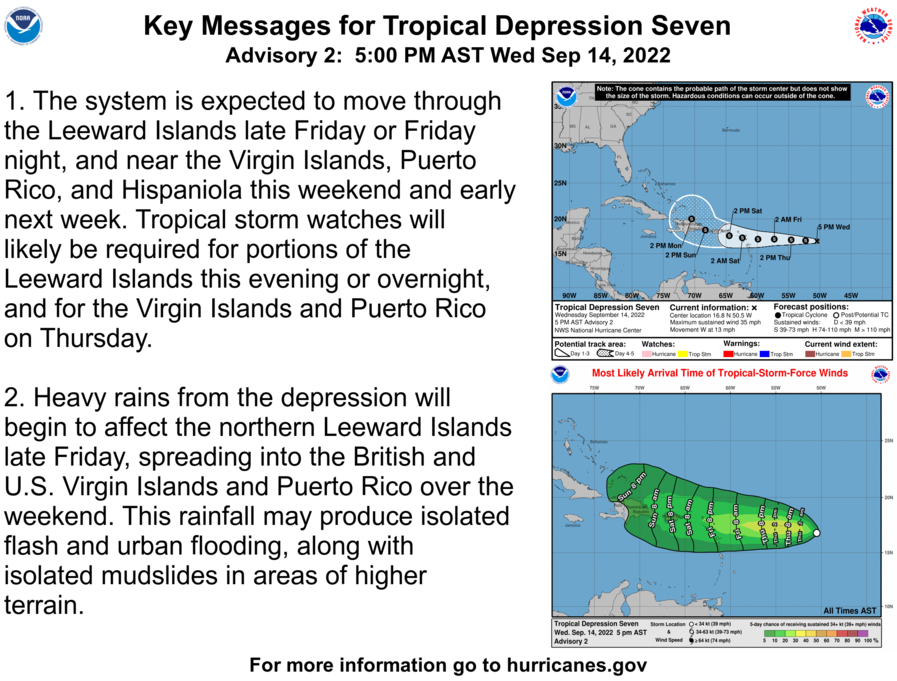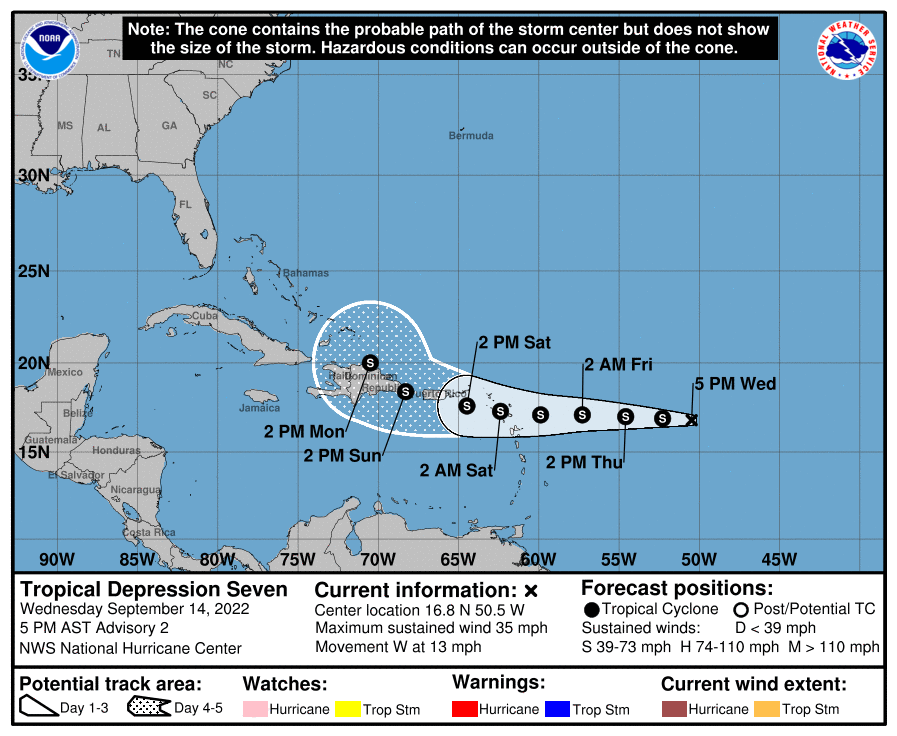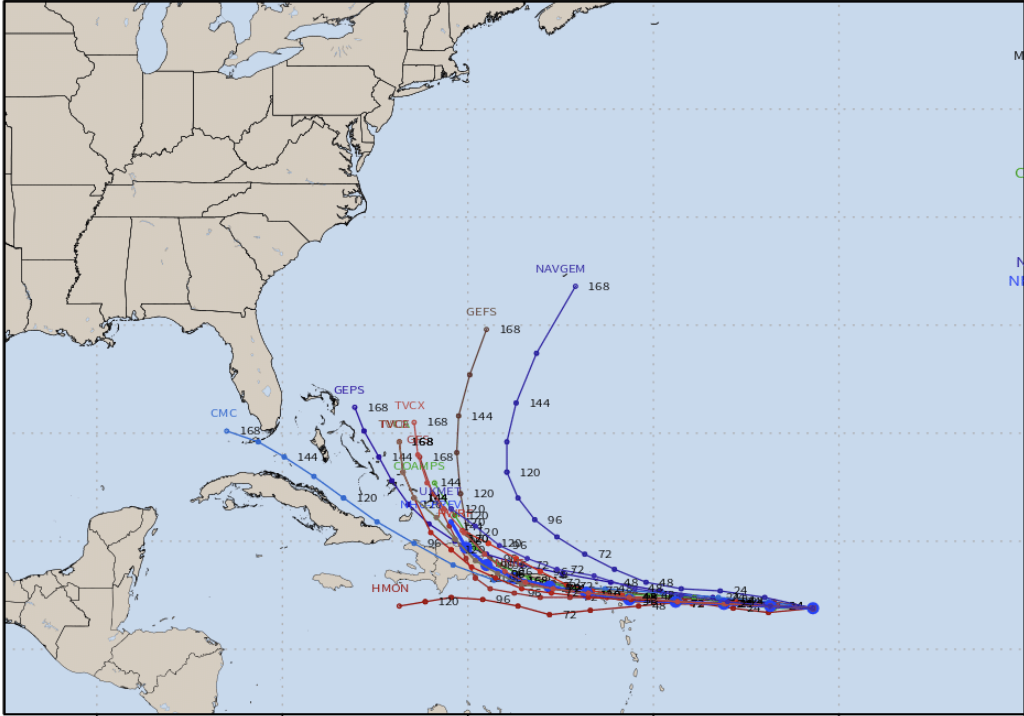Tropical Depression Seven forms in Atlantic
From NHC
DEPRESSION MOVING WESTWARD WITH NO CHANGE IN STRENGTH… …FORECAST TO BECOME A TROPICAL STORM TONIGHT OR THURSDAY



Tropical Depression Seven Discussion Number 2 NWS National Hurricane Center Miami FL AL072022 500 PM AST Wed Sep 14 2022 Deep convection has continued to burst near and to the east of the center of the depression this afternoon, but overall there has been no significant change in the system's organization. An ASCAT-C scatterometer overpass that arrived just after the release of the previous advisory revealed some believable 30-kt vectors within the eastern portion of the primary convective mass. Although the system continues to be affected by moderate westerly shear, it is likely not far from tropical storm strength. The initial intensity is held at 30 kt, and is based on the latest Dvorak estimate from TAFB. Arc clouds have been propagating away from the convection today, indicating that the system is located within a relatively dry mid- level environment. Since both the shear and dry air are likely to persist during the next few days, only modest strengthening is indicated in the official forecast. One change in the latest global model guidance is that most now maintain the system as a tropical cyclone into the eastern Caribbean, much like was shown in the previous NHC advisory. The latest NHC intensity forecast is unchanged from before, and calls for the depression to become a tropical storm tonight or Thursday. Little change in intensity is shown after that time due to environmental uncertainties and the potential interaction with land, and the official forecast lies near the statistical models (SHIPS and LGEM). The longer-term motion of the depression is generally west at about 11 kt. There is no change to the early portion of the track forecast reasoning. The depression is expected to be steered slightly north of due west along the southern side of a low- to mid-level ridge over the central and western Atlantic during the next few days. There is very little cross-track spread in the guidance during that time, but there is considerable along-track differences with the ECWMF much faster than the remainder of the guidance. The NHC official forecast is again closer to the HFIP corrected consensus and GFS ensemble mean, but it is slightly slower than the previous track through day 3. At days 4 and 5, there has been a change in the guidance since most of the models depict a stronger and more vertically deep cyclone by the end of period. This has resulted in a more poleward track toward the end of the forecast period, and the NHC track has been adjusted in the direction. There is still considerable uncertainty in the longer range portion of the forecast as there is a bifurcation in the ensemble guidance that is related to the system's intensity at the longer range. Ensemble members that keep the system weak generally show a faster and farther south track, than the official forecast. Key Messages: 1. The system is expected to move through the Leeward Islands late Friday or Friday night, and near the Virgin Islands, Puerto Rico, and Hispaniola this weekend and early next week. Tropical storm watches will likely be required for portions of the Leeward Islands this evening or overnight, and for the Virgin Islands and Puerto Rico on Thursday. 2. Heavy rains from the depression will begin to affect the northern Leeward Islands late Friday, spreading into the British and U.S. Virgin Islands and Puerto Rico over the weekend. This rainfall may produce isolated flash and urban flooding, along with isolated mudslides in areas of higher terrain. FORECAST POSITIONS AND MAX WINDS INIT 14/2100Z 16.8N 50.5W 30 KT 35 MPH 12H 15/0600Z 16.9N 52.3W 35 KT 40 MPH 24H 15/1800Z 17.0N 54.6W 40 KT 45 MPH 36H 16/0600Z 17.1N 57.3W 40 KT 45 MPH 48H 16/1800Z 17.1N 59.9W 40 KT 45 MPH 60H 17/0600Z 17.3N 62.4W 40 KT 45 MPH 72H 17/1800Z 17.6N 64.5W 40 KT 45 MPH 96H 18/1800Z 18.4N 68.3W 40 KT 45 MPH 120H 19/1800Z 20.0N 70.5W 40 KT 45 MPH $$ Forecaster Brown







